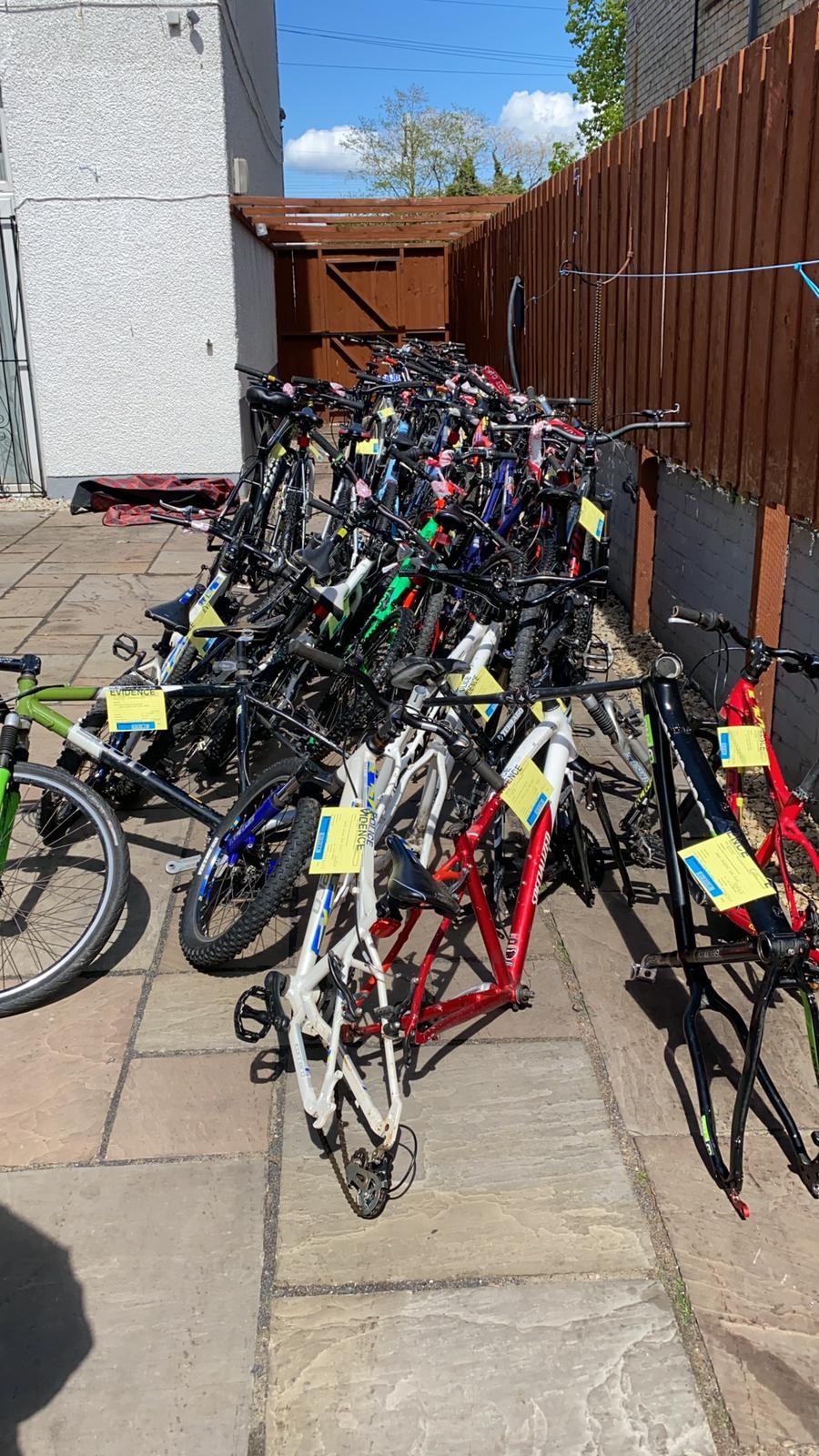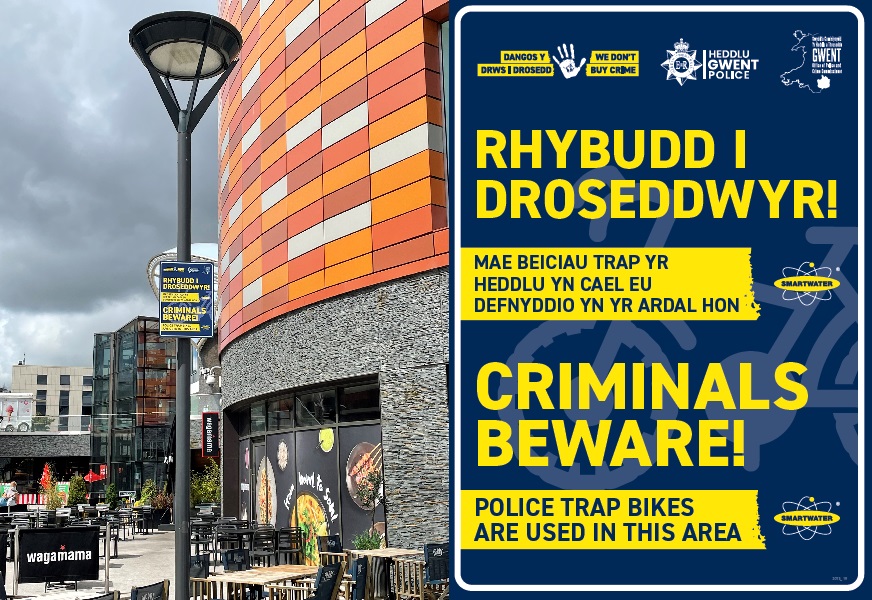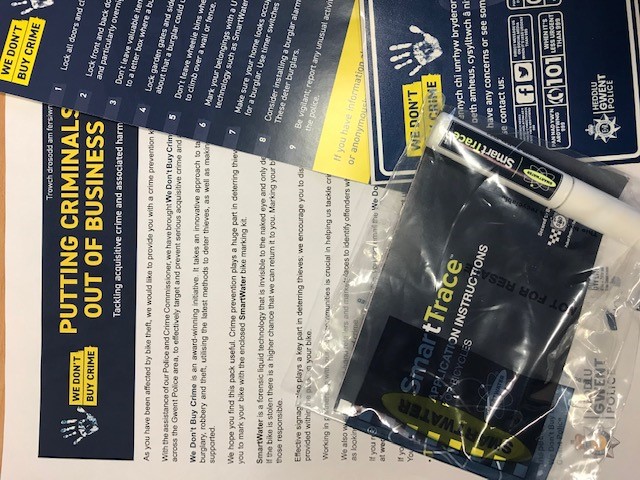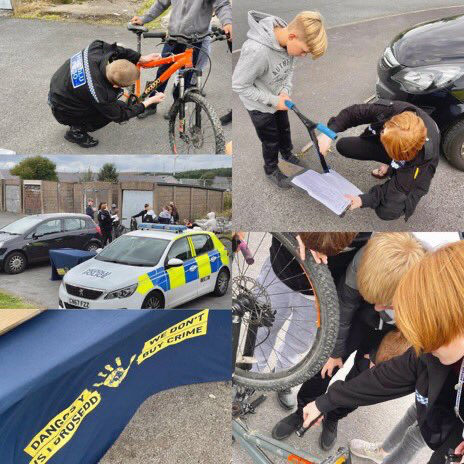Gwent Police and the Cycle Crime Reduction Partnership crack down on cycle theft
With over 77,000 bikes stolen across the UK last year and the value of some models reaching into the thousands, bike theft has become a lucrative avenue for many criminals. For Gwent Police, it became a priority to apprehend those responsible, seize and return the stolen assets and disrupt crime rings operating in their county.
The We Don’t Buy Crime department in Gwent Police implemented the Newport Cycle Crime Reduction Partnership (NCCRP) in March 2021 with the support of Mark Cleland, British Transport Police Superintendent and Lead for Cycle Crime in the UK. When comparing data 8 months later, looking at statistics from November 2020 to November 2021, there had already been a 29% reduction in bicycle theft across Newport.
As part of the work of the We Don’t Buy Crime (WDBC) department, officers are supported by the use of a range of strategies and approaches to combat all acquisitive crime, which includes the work around bike theft.
One of the successfully implemented tactics is the use of ‘trap bikes’ to target offenders in theft hotspots, such as city centres and holiday parks. Bikes are marked with the Secured by Design accredited forensic marking solution SmartWater, and are fitted with technology to assist officers in retrieving the police-owned bikes once they have been stolen. Numerous successful deployments of the ‘trap bikes’ resulted in several offenders being arrested for bike thefts, and in one instance, 58 suspected stolen bikes were seized from a single address, with many returned to victims.

In June 2021, a pattern of offending was identified that involved a number of bikes being stolen from a camp site and caravan park in Newport. Holiday makers visiting the area were being targeted at the National Trust site and were having items such as bikes and camping equipment stolen overnight. Investigations were completed by local Neighbourhood Policing Teams and response officers, but no suspects were identified due to the offender often wearing gloves and a mask during the thefts.
Traditional policing methods were unsuccessful, so a bid from the local Neighbourhood Policing Team was submitted to the WDBC department to look at covert techniques that could be deployed in the area. In mid-June, the department deployed two ‘trap bikes’ to the site under the guise that they were locked up on the back of a camper van. A few nights later, officers were alerted to the bikes moving and within minutes they had been taken to an address in a nearby housing estate, less than half a mile away.

Early the next morning, the WDBC team were able to identify the property where they had been taken, and entry to the property was secured. Inside the address was a man known locally to officers as an acquisitive criminal. The bikes were inside the address alongside numerous other items that were suspected to have been stolen, as well as both Class A and B drugs. Officers located a sophisticated CCTV system at the address that covered all entry and exit points of the flat and the surrounding communal areas. The thief was arrested and taken to custody.
Subsequent enquiries identified that the arrested male was in fact the handler of the ‘trap bikes’, and the caravan park thief had been captured on CCTV selling him the bikes in the early hours of the morning. The WDBC analyst carried out research on the other items seized by officers at the address and identified the victims of a stolen bike, garden statues and garden furniture. The handler was charged with handling stolen goods for these items as well as possession of Class A and B drugs.
The CCTV was instrumental in linking the original thief to a series of other acquisitive crimes in the local area. Although he was often covering his face in CCTV of the offences, he was identifiable through his clothing and the subsequent arrival at the handler’s address shortly after each theft.
The offender was arrested, charged with five theft offences, and remanded to court. After initially pleading not guilty to the offences, he changed his plea prior to the first day of the trial. The offender was sentenced to 12 months in prison and was ordered to pay substantial compensation to one of his victims. In total, over £3,500 worth of property was returned to victims who stated to police that they had given up all hope of ever receiving the items back.

Victim Personal Statements were obtained from victims and read out at the sentencing. The impact of the thefts and the joy of property being returned is evident in a quote from one of the statements: “I keep asking myself why anybody would want to steal my property, why would anybody want to cause me so much upset; I have never done anything to anyone - if anything I have only tried to help people.
“I never thought I would see my property again. I then received a phone call from Gwent Police to say they had found my property, and the next thing I knew there was a police van outside my address. As I walked outside, I could see they were returning my property. I just could not believe they had found it. I was so happy, I could have cried.”
 Arrests of thief and handler
Arrests of thief and handler
The impact of this offending in the Tredegar Park & Pillgwenlly wards is evident in this graph during the months of June and July. Being able to identify and arrest the offender through the deployment of the ‘trap bikes’ had an immediate impact on the crime statistics relating to bicycle theft in the area, with numbers dropping to the usual low levels in August. This also impacted on other volume acquisitive crime in the area.
As part of the collaborative approach to solving the theft issue at the locality, the Gwent Police Designing Out Crime Officer attended and completed a crime prevention assessment, which included recommendations to the owner on how to prevent further thefts. The report also documents where their vulnerabilities are and how they can be overcome with tried and tested measures.
In addition to the implementation of the ‘trap bikes’, Gwent Police also run regular forensic bike marking events, at which nearly 1000 bikes have been forensically marked since March 2021. Forensic marking of the bikes allows them to be easily identified and returned to owners in the event of them being stolen. All officers are equipped with dual purpose UV/LED torches as standard issue to enable immediate checks on people and property for forensic marking during person, vehicle and premises searches, as well as upgraded forensic marking detection facilities in custody. Deterrent signage has been placed throughout Newport highlighting the use of ‘trap bikes’, and this has been supported with a bike security social media campaign.

Furthermore, Gwent Police have changed the way they respond to reports of found bicycles. When a bike is located, the WDBC team are notified and work to trace the bike back to its rightful owner. They have also worked with their force control room to limit the number of stolen bike reports which are closed at first point of contact, highlighting the impact bike theft can have and its links to wider criminality. As such, a better service is provided to victims and further lines of enquiry are identified, with open collaboration with Neighbourhood Policing Teams also improving how bike theft is investigated.
Working in partnership with organisations who are part of the NCCRP has provided opportunities for information sharing and intelligence gathering as well as ensuring initiatives around cycle security are widely promoted and available to all cyclists.
One of these NCCRP members, The GAP Centre in Newport, is currently in the process of establishing secure bike parking in the city centre, which Gwent Police will be supporting with crime prevention tactics, target hardening, signage, and forensic marking.

Inspector Hannah Lawton, who heads up the WDBC department in Gwent, said the following:
“Through ensuring a holistic approach to acquisitive crime, including bicycle theft, we are able to identify, target and convict those committing this type of crime within our communities, as well as protect those living within Gwent. Whilst often seen as low-level criminality, this type of theft can have a big impact on victims and often has links to wider criminality.
“Working with key stakeholders and community partners has enabled a collaborative approach to ensure the most effective way of targeting this type of criminality.”
British Transport Police Superintendent Mark Cleland, Lead for Cycle Crime in the UK, commented: “Gwent Police’s ‘We Don’t Buy Crime’ approach is an excellent example as to how partnership working can really disrupt crime. Over the last 12 months PI Hannah Lawton and her team have implemented a number of tactics that have led to reduced crime across the board, not just cycle crime, and I would encourage others to learn from this approach and look to implement in areas which have similar issues.”
Doug Skins, Secured by Design, added: “It is great to see Gwent Police’s We Don’t Buy Crime initiative having a positive impact on cycle crime in their community. Secured by Design is working towards improving cycle security measures and infrastructure with member companies and stakeholders. This is a fantastic example of working with partners and the community to reduce crime.”
Further Information
Click here for bicycle security advice from Secured by Design
Click here to find out more about Gwent Police's We Don't Buy Crime initiative
Click here to watch Gwent Police's 'Investigating Bike Thefts' video